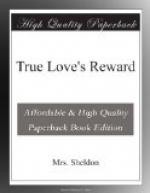“Now comes my second sin against your mother. If I had been loyal and true, I should have frankly told my aunt of my love for Mona Forester, and that I could never marry another woman, fortune or no fortune. But I shirked the duty—I thought something might happen before my return to give me the fortune, and then I should be free to choose for myself; so I led Miss Dinsmore to believe that on my return I would marry Miss Barton. I wanted the fortune—I loved money and the pleasure it brought, but I did not want Miss Barton for a wife. She was proud and haughty—a girl bound up in the world and fashion, and I did love sweet and amiable Mona Forester.
“Now my third sin: I was selfish. I could not bear the thought of leaving my love behind, and so I persuaded her to a secret marriage, and to go to Europe with me. I never should have done this; a man is a coward and knave who will not boldly acknowledge his wife before the world. I hated myself for my weakness, yet had not strength of purpose to do what was right. We sailed under the name of Mr. and Mrs. Richmond Montague, and Mona did not know that I had any other; but I took care that the marriage certificate was made out with my full name, so that the ceremony should be perfectly legal.
“We were very happy, for I idolized my young wife, and our life for six months was one of earth’s sweetest poems. We traveled a great deal during the summer, and then settled in Paris for the winter. We had rooms in a pleasant house in a first-class locality; our meals were served in our own dining-room, and everything seemed almost as homelike as if we had been in America.
“One day I took a sudden freak that I wanted to go hunting. Mona begged me not to go; she was afraid of fire-arms, and feared some accident. But I laughed at her fears, told her that I was an expert with a gun, and went away in spite of her pleadings, little thinking I should never see my darling again. I did meet with an accident—I fell and sprained my ankle very badly, and lay for several hours in a dense forest unable to move.
“Finally some peasants found me, and took me to their cottage, but it was too late to send news of my injury to Paris that night. But the next morning early I sent the man of the house—who was going through the city on his way to visit some friends for a week, with a letter to Mona, telling her to take a carriage and come to me. She did not come, and I heard nothing from her. I could not send to her again, for there was no one in the cottage to go, and no neighbor within a mile. I was terribly anxious, and imagined a hundred things, and at the end of a week, unable to endure the suspense any longer, I insisted upon being taken back to Paris in spite of the serious condition of my foot and ankle.
“But, oh, my child, the tidings that met me there were such as to drive the strongest mind distracted. The landlord told me that my wife had fled with the butler of the house. At first I laughed in his face at anything so absurd, but when he flew into a towering passion and accused me of having brought disgrace upon his house by living there unlawfully with a woman who was not my wife, I began to think there must be some truth in his statements. In vain I denied the charge; he would not listen to me, and drove me also from his dwelling.




